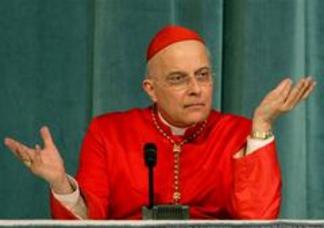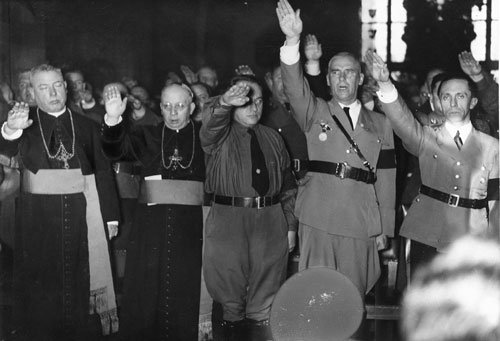Here is the pot calling out the kettle… This man has no shame!
Cardinal Francis E. George of Chicago says the city’s mayor showed contempt for many residents’ beliefs by stating that Chick-fil-A’s stance on marriage was against “Chicago’s values.”
 “Recent comments by those who administer our city seem to assume that the city government can decide for everyone what are the ‘values’ that must be held by citizens of Chicago,” the cardinal wrote in a July 29 online post, responding to Mayor Rahm Emanuel’s assertion.
“Recent comments by those who administer our city seem to assume that the city government can decide for everyone what are the ‘values’ that must be held by citizens of Chicago,” the cardinal wrote in a July 29 online post, responding to Mayor Rahm Emanuel’s assertion.
“I was born and raised here, and my understanding of being a Chicagoan never included submitting my value system to the government for approval,” Cardinal George wrote.
He wondered: “Must those whose personal values do not conform to those of the government of the day move from the city? Is the City Council going to set up a ‘Council Committee on Un-Chicagoan Activities’ and call those of us who are suspect to appear before it?”
“I would have argued a few days ago that I believe such a move is, if I can borrow a phrase, ‘un-Chicagoan.’”
The cardinal made his remarks on the Catholic Chicago blog after the mayor ventured into an ongoing controversy about the Chick-fil-A restaurant chain.
Many homosexual “marriage” advocates took offense at company president Dan Cathy’s support for “the biblical definition of the family unit” in a recent interview.
During a July 30 press conference, Mayor Emanuel said he stood by his July 25 statement that was interpreted by some as supporting a plan to bar the restaurant from the city’s First Ward.
After Alderman Proco Moreno said he would block the restaurant’s plan to open a new location, Emanuel issued a statement saying that “Chick-fil-A values are not Chicago values.”
“They disrespect our fellow neighbors and residents,” the mayor stated. “This would be a bad investment, since it would be empty.”
But a spokesman for the mayor told NBC 5 Chicago that Emanuel did not intend to stop Chick-fil-A from opening, despite his conviction that the Christian-run company’s values were not those of the city.
In Monday’s remarks, the mayor appeared to identify the city’s “values” with government policy on homosexual unions, saying: “When it comes to values, there’s a policy as it relates to gay marriage. The values of our city are ones that welcome and recognize that, and I will continue to fight for that.”
Emanuel’s statement also appeared to identify civil unions – which Illinois implemented in 2011 – with homosexual “marriage,” which has never been instituted in the state. The mayor personally supports a measure to redefine marriage, which was introduced in February but has stalled in the legislature.
In his response to the mayor on Sunday, Cardinal George spoke out on behalf of Catholics, and others, whose “values” do not include what he called “gender-free marriage.”
The cardinal stressed that authentic marriage exists prior to any decree of the state or Church, due to the complementarity of the two sexes and their procreative potential.
The natural definition of marriage is not “bigotry,” nor is it unique to a particular religion, he said.
“People who are not Christian or religious at all take for granted that marriage is the union of a man and a woman for the sake of family and, of its nature, for life,” Cardinal George noted. “The laws of civilizations much older than ours assume this understanding of marriage.”
But the Chicago archbishop also pointed to Jesus Christ’s teaching on marriage in the Gospel of Matthew, in which the Lord affirms marriage as the unbreakable union of a man and woman as “one flesh.”
The citation prompted him to pose a question as to whether Jesus’ own “values” were still welcome in Chicago by Mayor Emanuel’s standards.
“Was Jesus a bigot?” he asked. “Could Jesus be accepted as a Chicagoan?”
To answer your question, Francis; Jesus wan’t a bigot. But the same can’t be said about you. Sheesh!
Complete Article HERE!




